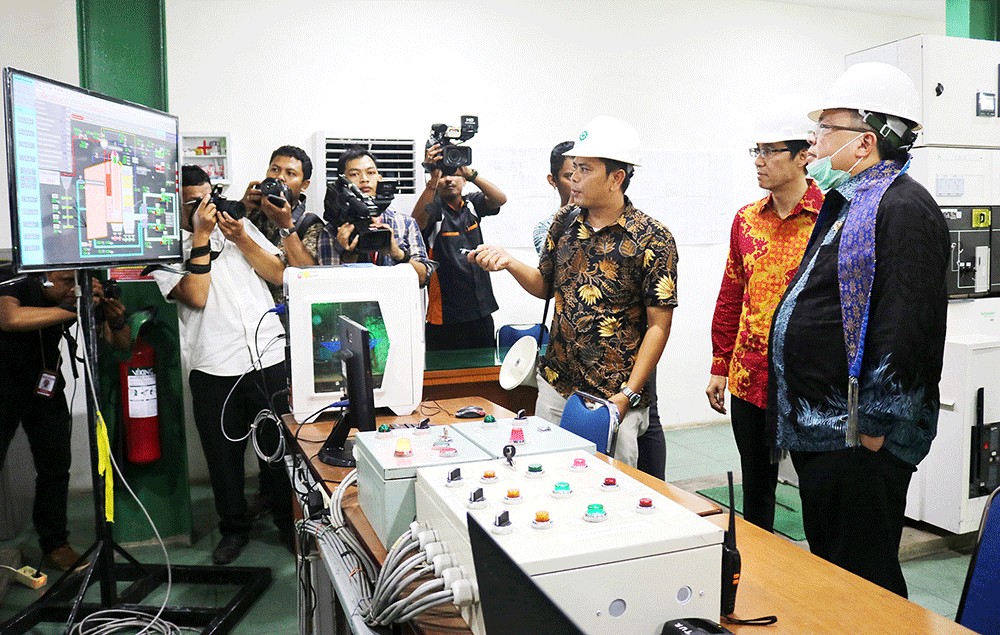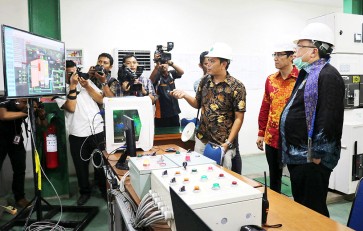Popular Reads
Top Results
Can't find what you're looking for?
View all search resultsPopular Reads
Top Results
Can't find what you're looking for?
View all search resultsIndonesia lags behind in renewable energy investment
Government regulations are partly to blame for Indonesia's ongoing struggle to raise money to develop renewable energy.
Change text size
Gift Premium Articles
to Anyone
 National Development Planning Minister Bambang Brodjonegoro (right) listens to explanations after the inauguration of a biomass-fueled power plant in Wajok, Mempawah regency, West Kalimantan, on Monday. The ministry supports the development of renewable energy in the country through the non-state budget infrastructure funding (PINA) scheme. (Antara/Jessica Helena Wuysang)
National Development Planning Minister Bambang Brodjonegoro (right) listens to explanations after the inauguration of a biomass-fueled power plant in Wajok, Mempawah regency, West Kalimantan, on Monday. The ministry supports the development of renewable energy in the country through the non-state budget infrastructure funding (PINA) scheme. (Antara/Jessica Helena Wuysang)
F
our years on from the historic Paris climate conference, Indonesia is still struggling to raise investment to develop renewable energy. Experts say the blame lies partly with government regulations, which stunt the development of renewable energy in Indonesia.
Since 2017, Fabby Tumiwa, executive director of the Institute for Essential Services Reform (IESR), a Jakarta-based sustainability think tank, has observed renewable energy capital flight from Indonesia. “The regulations do not reflect the business model of renewable energy projects; the price is not so attractive; [there is] unequal risk-sharing between PLN and the developers, so [investors] all flee,” said Fabby.
On the one hand, Indonesia is likely to meet its Paris Agreement targets, but only because the goals were very unambitious to begin with. Such an effort would still be insufficient to curb climate change, according to experts from The Climate Action Tracker, an independent scientific analysis tracking climate change.
“Even with the big coal expansion planned in Indonesia for the electricity sector, even with the emissions increasing in all sectors, [Indonesia] would still overachieve [its] nationally determined contribution,” said Leonardo Nascimento, a climate policy analyst at the NewClimate Institute, a climate change NGO.
The more relevant and ambitious target is Indonesia’s goal of generating 23 percent of its energy from renewable sources by 2025. Last year, the number stood at just over 8 percent, according to data from state-owned electricity company PLN, with hydropower contributing the most, followed by geothermal energy.
But renewable energy development in Indonesia remains sluggish, and the government shows no sign of curbing the expansion of coal, with plans to build more coal-fired power plants under Jokowi’s signature 35,000 megawatt electricity program.
Investment in the renewable energy sector was only US$1.6 billion in 2018, the Ministry of Energy and Mineral Resources announced earlier this year. That is only 10 to 15 percent of the level of investment needed if Indonesia wants to meet its 23 percent target, according to Fabby.

















